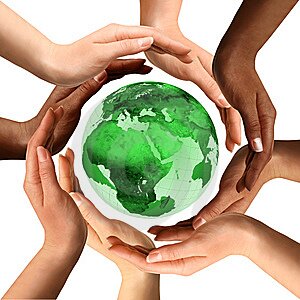January 2013 Editorial
Bismillahir-Rahmanir-Raheem
Inside each one of us, there is a desire to be part of something bigger than ourselves; to believe that our lives have a significance beyond our daily routines, work and family dramas; to be an integral part of the bigger picture.
If you look at the people around you who are striving to live purposeful lives, you will notice that they all affiliate themselves with something that matters to them, a cause they believe in. For some, the bigger picture is their extended family, or their neighbourhood, or their ethnic group. And for many of us, the bigger picture is about who we are as Muslims, about the greater Islamic family: the Ummah.
As a revert, the idea of belonging to a global family defined by the bonds of faith and mutual respect and responsibility is a powerful one. Here, in the arms of the Ummah, we expect to shed the barriers of race, class, culture and caste, and embrace each other as sincere brothers and sisters in faith. We expect to be welcomed, to be valued and to share in each other’s triumphs and tragedies as equals.
This ideal is especially attractive to those who have braved the scorn of family, friends and the wider society to step into the unknown and start living the ways of our new faith. Having cast much of our old identity aside in favour of a new, more Islamic version of ourselves, we expect the warmth and welcome of our new faith family to ease the pain of this transition.
Unfortunately, as many reverts will testify, this is not always the case. Often, the euphoria that surrounds a new shahadah is short-lived: offers of assistance begin to flow less freely just as the expectations and demands increase. We experience things we never thought possible when we first embraced Islam: rejection, prejudice, cultural chauvinism, racism, sexism, judgement, pressures related to how we dress, when we get married and endless other do’s and don’ts. All of a sudden, the Ummah doesn’t seem such a great place to be any more.
And this is the Ummah on a personal, local level. On an international scale, the Ummah is in a state of loss and turmoil. Success stories are few; stories of war, rebellion, drought and devastation are too many to count. Indeed, if the Muslim Ummah were a physical entity, it would be bleeding, riddled with disease, humiliated.
Why, then, did we choose the Ummah as our theme for this issue? Why, when there is so much to lament, did we choose to celebrate the larger Muslim family?
It may be because, in spite of all its complications and contradictions, there is something special about this community forged by faith. Allah SWT has honoured this community with His guidance, mercy and glad tidings.
And then there are the little things: the random acts of kindness, selfless generosity, unflinching solidarity and pure love for the sake of Allah SWT, that remind us of what the Ummah could really be. Because the Ummah is not some intangible entity outside of ourselves: it is you and it is me. The Ummah is every single one of us. And if we want to help the Ummah, if we want to improve our condition as Muslims, it starts with us. It starts with us seeking knowledge of this deen so that we can understand where we are going wrong and how to rectify ourselves; it starts with us cleansing ourselves, elevating ourselves, striving to live up to our potential as Muslims. And it starts with us passing on what we learn – to our families, friends, communities, in ever widening circles.
And, if we do all this, with true sincerity and trust in Allah SWT, do you have any doubt that we will see a change in the condition of the Ummah? That we will be able to taste the sweetness of true brotherhood, true sisterhood? That our communities will become enlightened places of worship, acceptance and joy?
I don’t. So how about we get the ball rolling, starting today?
May Allah swt accept all the work that we do within the Ummah and make us a cause for its revival, ameen.
Na’ima B.
